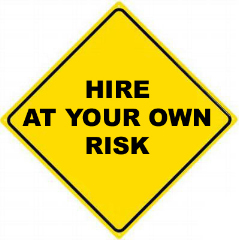Risk and Research Factor (RnR Factor): When Hiring New Employees, Your Amount of Risk Depends on The Amount of Research
August 1, 2010 by Gary Birshtein· Leave a Comment
Hello Colleagues,
 Since this blog is my way to communicating my thoughts to the audience of business associates, friends, clients and website visitors I always like to start with a greeting knowing that there is a real people reading this. So hello again.
Since this blog is my way to communicating my thoughts to the audience of business associates, friends, clients and website visitors I always like to start with a greeting knowing that there is a real people reading this. So hello again.
Most of you who have met me, spoke with me (or may be heard about me) know that I choose the hard (and may be uncomfortable) truth that generates results over the sugar coated compliments that generally lead nowhere. This is just who I am.
Here is what I was going to share with you.
I get a phone call the other day from a friend who was looking to buy used car asking for my advice. I am not a car pro, but I do my due diligence before I spend my money. The RnR Factor is always something that I consider when making money decisions. At the end of the day all I want is the best value for the best price, is that too much to ask?
Interesting enough, this conversation reminded me of conversation I have had with sales manager at the company that was selling financial services. They were looking for my help at changing the 20/80 rule that they found themselves stuck to. 20% of their sales people were making 80% of the profits for the company. At the same time sales people that were average or below average were also contributing to the turnover in the company which is never a good thing.
My very first question to him was about the selection process – what process do you have in place to hiring sales people? They didn’t really have any. With $36,000 annual salary and generous commission structure (top people earn $150,000-180,000 per year) this company was using standard interview process: sort resumes, couple of interviews, phone call to the references, flip a coin, throw a dice, you are hired.
Somehow in my head I started to compare car buying experience vs. hiring experience. Both my friend and my client wanted to get a quality product that will last for a long time and perform well.
The big difference was that my friend was looking to spend around $20,000 and was going to do all the research possible vs. my client was spending $36,000 salary (+ whatever company didn’t make in commissions) to hire sales people without research or due diligence.
Now, whoever is reading this thinking: “how could he compare buying a car to hiring a person” – yes I can. If you spending lots of money and you don’t do proper research on what you are actually getting it doesn’t matter what its being compared to, the end result is going to be the same.
As most of you understand by now the point I was making is: in life, you generally get what you pay for. If you willing to spend some time and little bit of money doing research prior to car purchase, you’ll probably end up with a good vehicle that will last you for a long time.
However when it comes to hiring new employees, if you don’t have a way of measuring and benchmarking behavioral attributes in order to evaluate employee that is coming in to your organization, if you can’t assess the overall job fit and don’t perform basic skills testing, what do you actually expect?
I gathered some information from the car experts listing 5 most important things that you should know when purchasing a vehicle. Have a look at this list and think how information below can help you take out the rick factor from expensive purchase or investment that you are about to make.
Remember that Amount of Research will equally impact on the Amount of Risk. The more information you’ll have the less of a risk you’ll be taking.
Taking a risk out of car buying process
First, choose the right car. You won’t get a good deal if you just browse from dealer to dealer without knowing what kind of car you are looking for. The first step – You need to decide what exactly you want.
– Developing ideal employee profile is instrumental in identifying who you are looking for.
Second, be prepared. Do as much research as you can. Read reviews, consumer reports, ask colleagues and friends, compare options, and gather gas consumption data on the make and model you’re interested in.
– Using assessment/evaluation tools determine the behavioral characterizing of the prospect.
Third, without a doubt, you should check a car’s history records. This will help you to eliminate half of the vehicles from your list with potential problems.
– Conduct job match analysis. If needed, background and credit check.
Fourth, Don’t buy based on what you’ve been told because it may not always be the truth. Check out the car yourself very carefully. Ask a knowledgeable person who knows about cars to help you.
– In today’s job market relying on references doesn’t mean much. If you still not convinced on your decision you simply don’t have enough right information.
Fifth, Be extremely careful when doing the paperwork. For example, if you buy from a private owner, make sure there are no registered liens against the vehicle and that the person who signs the Bill of Sale is the actual owner of the car. Check with the Vehicle Registration Authorities to make sure the car has not been stolen.
– Don’t underestimate to power of background check, and overall integrity assessment. You could never have too much information.

